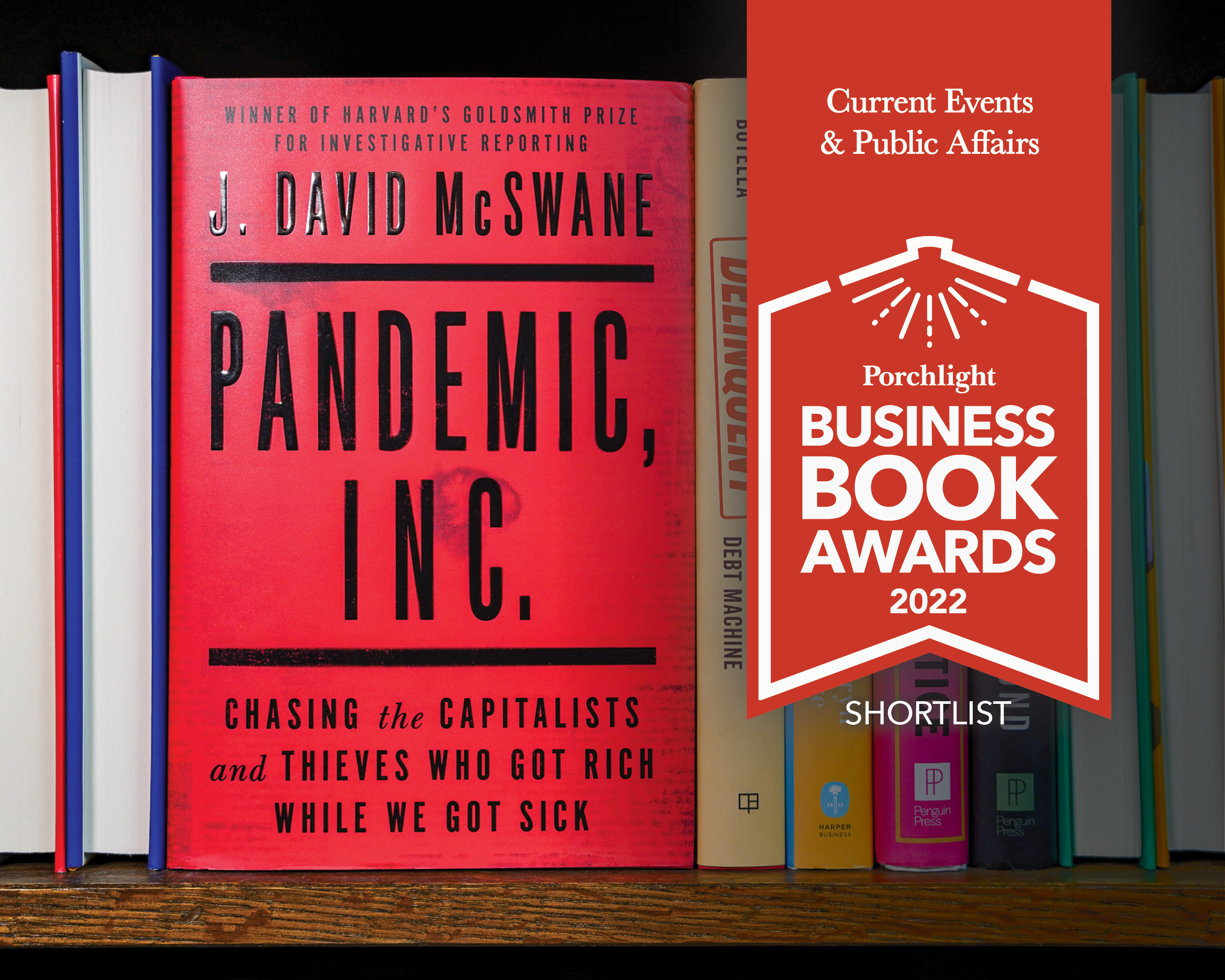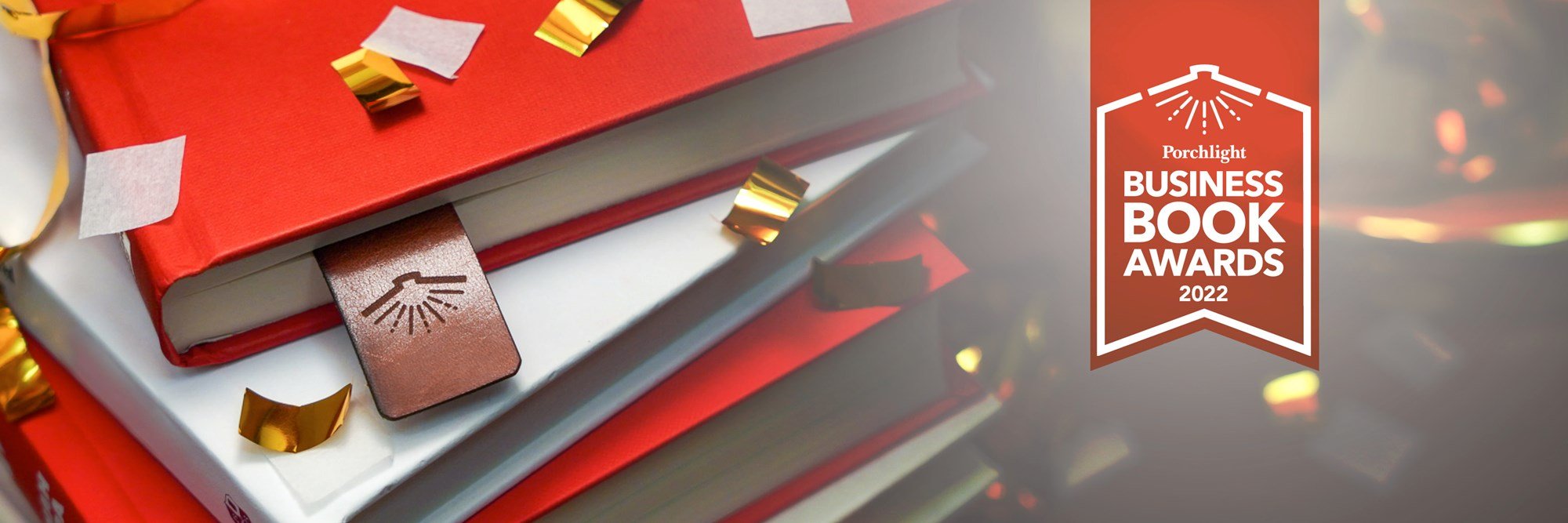Pandemic Inc. | An Excerpt from the 2022 Porchlight Current Events & Public Affairs Book of the Year
It feels like we have moved past the pandemic, and hopefully we are past the very worst part of it, but there is an awful lot we must learn from the most awful parts of it so far. Much of that has to do with how it was managed, and who profited off of its mismanagement. There were both systematic and individual failures that made America more vulnerable that it could and should have been, failures documented more fully and unflinchingly in J. David McSwane's Pandemic, Inc.
The following excerpt is the Author's Note at the beginning of the book.

I know what you’re thinking.
Why, after all we suffered, would I read a book about the COVID-19 pandemic? I already experienced it!
Not like this, you haven’t. The story that will unfold in these pages is as outrageous as it is true. What happened to us was unacceptable and heartbreaking, yes, but I do not wish to depress you further. No, anger is more useful than despair.
My goal in writing this book is twofold. First, to make some sense of the larger system churning over our heads and its role in our nation’s missteps—that is to say, unfettered capitalism and its byproduct, greed.
Second, for posterity. Some unbelievably stupid and tragic things happened. The story of how America’s obsession with capitalism left us for dead while pirates plundered is at once anger-provoking and yet, at times, so twisted that all we can do is laugh. I managed to get a front-row seat to some of it. I pray that this story will serve as a guide to future generations on what exactly they shouldn’t do if faced with such a crisis.
The purpose of this book is not to retrace a definitive account of all things COVID, nor is it to remind people of all the disappointments and horror that we by now have drowned out with Netflix, alcohol, and Peloton bikes. I’ll spare you the grotesque postmortem and thumb-sucker dissertations on policy, economics, and global trade.
Instead, I invite you on a journey through the shady networks of brokers, scammers, investors, and profiteers who did insane things to get rich while our nation suffered an incalculable loss of life and global standing. They are the inhabitants of a world we encouraged, we created, long before we elected a documented swindler to the Oval Office. This is who we are, though I pray it is not all we can be.
It began on a reporting assignment in April 2020, which involved a mask broker and a private jet. Upon my return, I felt what I’d seen was too bizarre to be molded into the conventions of routine journalism. In fact, so much of what happened, from the White House down to city hall, begged for something more. I set out on an immersive first-person quest of sorts to get it all down. In doing so, I defy some convention. Investigative reporters are not usually invited to crack wise, though these were, as we know, unprecedented times. I have in many instances forgone the antiquated notion of wishy-washy two-sides reporting that fails to hold to account partisan hacks and welcomes false equivalency. I neither belong to nor curry favor with any political party, though neither do I profess to be some robotic arbiter of objectivity. There was one party and one administration handling the arrival of the coronavirus, and its failure to rise to the occasion is definitive and damning. I have treated this legacy with the reverence it deserves. Members of the other party also made mistakes, and I have pointed them out.
I have resisted the notion that capitalism itself is to blame for all of this, though I understand the temptation. President Donald Trump’s admitted effort to downplay the virus to prevent a stock market scare is a strong point to consider. We will never know how many lives might have been spared if the president were as concerned with charts of rising American deaths—which he dismissed as “it is what it is”—as he was charts-tracking the S&P 500 Index.
It is impossible to disentangle the callous and inept response of the Trump administration from the broader social, political, and economic forces that also contributed to America’s failure. Can we realistically cast blame on our system entirely when it is unfathomable that either Presidents George W. Bush or Barack Obama would have handled the pandemic as poorly as Trump did?
To piece these stories together, I reviewed many thousands of records and interviewed more than one hundred people, mostly on the record. With the exception of one already published example, I do not quote anonymous sources or allow such a source to stake a significant claim. Any background conversations I had served the purpose of bulletproofing a certain context or to help me better understand a complex issue or timeline.
There are scenes and chapters in this book that draw from what I saw and heard and what is in my notes and voice memos. I could not be everywhere, however, so I rely at times on others’ reporting at Pro-Publica, the New York Times, the Washington Post, STAT News, Kaiser Health News, and many more. I am grateful for the work of these many journalists, and I’ve cited them often.
If this sort of tale still sounds appealing, strap in. Our journey begins, as with so many disappointments, in Washington, D.C.
From PANDEMIC, INC. by J. David McSwane. Copyright © 2022 by J. David McSwane.
Reprinted by permission of One Signal Publishers/Atria Books, a Division of Simon & Schuster, Inc.
ABOUT THE AUTHOR
J. David McSwane is a reporter in ProPublica’s DC office. Previously, he was an investigative reporter for The Dallas Morning News and the Austin American-Statesman. McSwane’s reporting has spurred new laws, state and federal criminal investigations, and forced belt-tightening lawmakers to invest in social programs. He has won numerous awards, including Harvard’s Goldsmith Prize for Investigative Reporting, the Worth Bingham Prize, a Scripps Howard Award, two Investigative Reporters and Editors Awards, and the Peabody.



